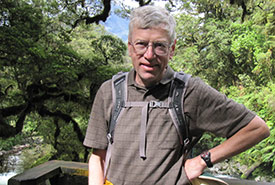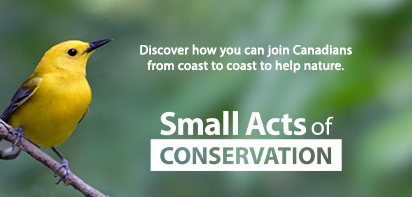
John Grandy, Ontario board chair (Photo courtesy of John Grandy)
Q & A with Ontario Regional Board Chair John Grandy
Since 2018, John Grandy, a retired investment broker, has chaired the board of the Nature Conservancy of Canada’s Ontario Region. An avid hiker, John’s passion for the environment drives his philanthropic and volunteer endeavours. He serves as the vice board chair for the Bruce Trail Conservancy, is a national trustee of Canadian Parks & Wilderness Society, former director of Wildlife Preservation Canada and a supporter of Ontario Nature. In 2013, he wrote a report on Canadian environmental charities for Charity Intelligence Canada.
NCC recently sat down with John to chat about why land conservation is important to him and the future of conservation in Canada.
Q: How did you get involved with the Nature Conservancy of Canada?
A: It started about five years ago. I was asked to write a report on environmental charities on behalf of Charity Intelligence. I interviewed NCC and was very impressed. When a position came up to join the Ontario board I accepted that position.
Q: What is it about NCC that inspires you?
A: Within that space of environmental charities, I found that NCC was one of the most disciplined in terms of focusing on their mission and executing it professionally. NCC is very disciplined financially, but I think more importantly, I like the people. I like the staff and other volunteers that I’ve met through my work on the board, and I find a lot of pleasure in working with them and focusing on our mission.
Q: Is there a particular individual that has really inspired you?
A: I would say that overall everyone I have met has a very high level of professionalism. One person that really stood out for us was James Duncan, former regional vice-president for Ontario, who passed away suddenly last year.
Q: How do you feel that your work with NCC leaves a legacy?
A: I don’t think of it so much in terms of leaving a personal legacy but in leaving a legacy for our children and grandchildren by conserving some of the most endangered and precious wild spaces in Canada. I think this work is invaluable.
Q: Is there a particular project that NCC has done that you could point to and say “I’m really proud to be a part of that project”?
A: The most exciting thing that we’ve done in Ontario over the past few years has been the Big Trout Bay project. It’s an absolutely stunning piece of conservation work that has preserved one of the last true wilderness areas on the western shores of Lake Superior. That’s something I am quite proud to be associated with.
Q: When you’re talking to other individuals about the organization, what is it that you say to them to convince them that they should be a part of NCC?
A: I find it’s quite an easy sell, to be honest, because the organization has such a high reputation and has been doing good work for such a long period of time that we have good brand recognition. People are generally aware of the clear focus that NCC has on science-based conservation, and they are generally aware of the fiscal and financial discipline and management that we have.
Q: Why do you think conservation is important?
A: I think for Canadians, a lot of our identity as a nation is tied up in the wild spaces of this country, in our wilderness areas, in our iconic landscapes, and in the plants and animals in those spaces. I don’t think people realize often enough just how threatened these spaces are. Although we don’t have a huge population here in Canada, the impact we have on the environment is huge. It is so important to set aside some space in this country for future generations. The federal government has committed to preserving 17 per cent of Canada’s land mass for conservation. But the government can’t achieve this on its own. That’s where organizations like NCC come in because we can work with private land owners to preserve their portions of the landscape through purchase, conservation easements or other means. It is a very important role for us to play along with the other land trusts that we work with.
Q: Where do you see NCC going in the future?
A: I think we are doing excellent work right now, but I think there is room for us to leverage our work. We can work with other organizations, Indigenous Peoples and with governments to try to preserve larger parts of the country that don’t involve outright acquisition. One example of this is the Lancaster Sound project, where a huge marine area has been set aside for conservation. NCC was able to work with oil and gas interests, Indigenous communities and various levels of government to make this project possible. That's the sort of new concept we have started to pursue and that I think is an opportunity for significant leverage in the future.




